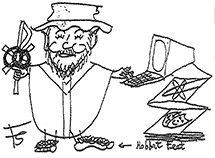John Polanyi’s life was saved by penicillin. He recounts this story of discovery and final medical use in an address in April, 2007, and most of his speech appeared in a recent issue of the Toronto Star.
It is a remarkable story. It begins with the almost accidental discovery of the healing properties of the penicillin mould by Sir Alexander Fleming and the succession of sometimes intentional and sometimes chancey events and experiments of various members of the science community: the Australian Rhodes scholar Howard Florey, a refugee biochemist Ernst Chain, and an English analytical chemist, Norman Heatley.
Then there was a role for a mouse, who was cured by the penicillin and survived the dose of it, and whose urine played a significant part.
And there was Heatley’s trip to a biscuit factory to acquire 100 biscuit tins for growing mould, and later his order of 500 covered bedpans (variants on the common potty, I suppose) for the same purpose.
Along the way there was an unfortunate policeman who was almost cured of septicemia, but the supply of the drug ran out, and he died. And we must not forget the Rockefeller Foundation, and the donor of another grant, Sir William Dunn, a South African who provided a professorship to alleviate human suffering; - by this he meant the advancement of Christianity - it was directed to pathology , the study of disease.
Eventually, John Polanyi was cured by penicillin because his father, the scientist-philosopher Michael Polanyi, was friends with the Howard Florey family.
To me, this seems miraculous, full of wonder. It shows that a train of events leads to a happy ending, partly because of the training and perception of experts, and partly because of good will, and partly because of fortunate coincidence. Polanyi himself says he owed his “life to being born at just the right time and into a community of scientists… a community of rather ordinary people, who, by dint of passionate effort, achieve quite extraordinary things.”(Toronto Star, Sunday May 6, 2007, page D9)
This is the way it works, the practice of science in search of the discovery of truth and for the benefit of applied knowledge. And what a blessing that the intention of Sir William Dunn of alleviating human suffering was not carried out by using Christianity as a sort of magic ointment, but rather by using human brains and goodwill to advance science and medicine.
I am very grateful to a friend who has pointed out that this sequence of events reminds her of a sentence from scripture which we use at the end of our Church service: “Glory to God whose power working in us can do infinitely more than we can ask or imagine.”
What Christian believers can learn from this good story of healing is that when we thank God for the “power working in us” we include the intelligence and labour of many people of quite varied beliefs, and that science and the art of medicine have indeed enabled humanity “to do more than we can ask or imagine.” God does not need the credit, but we believers have a need to give God praise and thanks.
That is why we worship God: because we need to.

